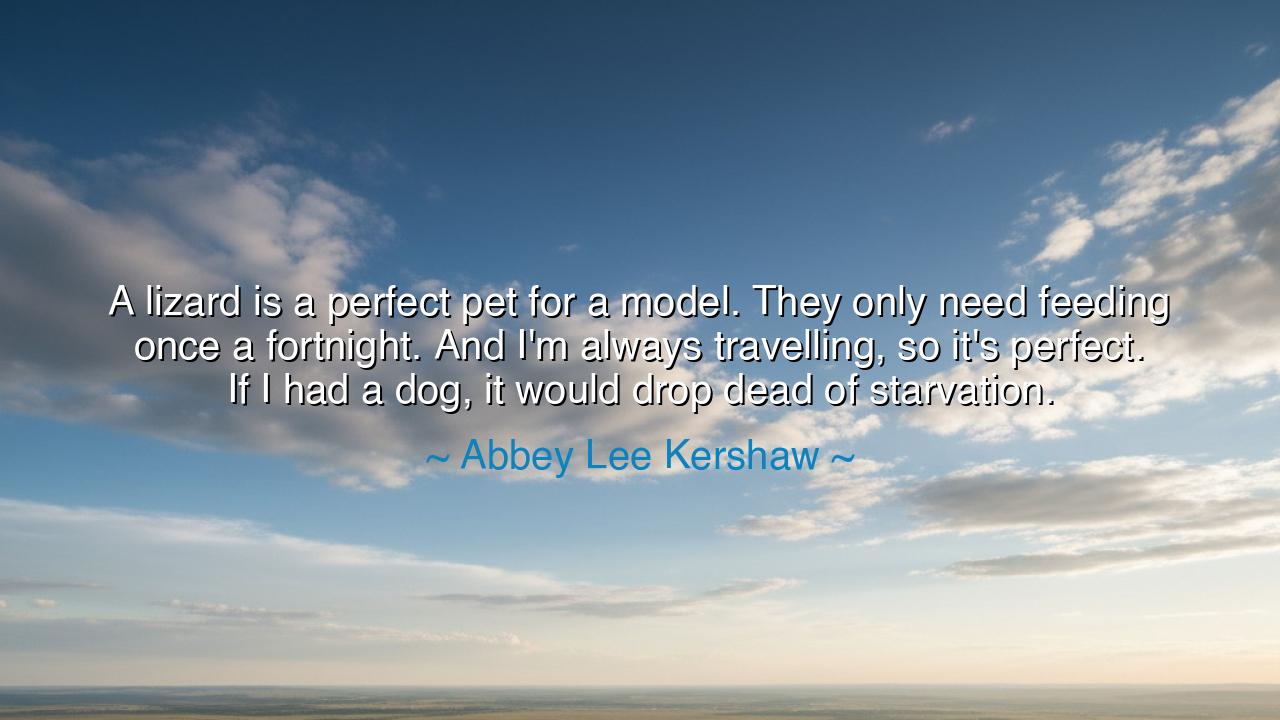
A lizard is a perfect pet for a model. They only need feeding
A lizard is a perfect pet for a model. They only need feeding once a fortnight. And I'm always travelling, so it's perfect. If I had a dog, it would drop dead of starvation.






Hear now the words of Abbey Lee Kershaw, whose life upon the road as a model is marked by constant movement, and who declared with candor and humor: “A lizard is a perfect pet for a model. They only need feeding once a fortnight. And I’m always travelling, so it’s perfect. If I had a dog, it would drop dead of starvation.” At first, these words may strike as light and jesting, but beneath them lies a reflection on responsibility, on the nature of companionship, and on the choices that life’s path demands.
The ancients understood that every bond between human and creature carries a sacred weight. To take in a pet is not merely to enjoy its presence but to shoulder the duty of its care. Kershaw, in her truth-telling, reveals the wisdom of acknowledging one’s limits. She knows that a dog, with its unquenchable hunger for closeness and daily tending, would suffer under her absence. Yet a lizard, austere and enduring, thrives under minimal needs. Thus, she chooses rightly: not through sentimentality, but through honesty about the life she leads.
Consider the tale of Alexander the Great, who, though he loved his horse Bucephalus more dearly than gold, knew the price of that bond. Bucephalus required constant care, food, and rest, even as armies marched and nations fell. Alexander bore that burden gladly, for his life allowed such devotion. Yet if he had not been able, to keep the horse would have been cruelty disguised as love. So too in our time, one must match one’s companionship with one’s capacity. Love without responsibility is but vanity; responsibility without love is but slavery.
Kershaw’s words also remind us of the dignity of knowing what fits one’s own season of life. The lizard, ancient in its stillness, teaches patience, endurance, and self-sufficiency. It is a creature whose needs are sparse, yet whose presence is steady. In choosing such a pet, one learns that not all relationships need to be fiery or constant; some may be calm, occasional, and balanced. The dog, noble and loyal, teaches another lesson: that devotion demands daily giving. But if one cannot give, better to refrain than to betray.
Let us also see in this quote the courage of self-awareness. Many in the world take companions they cannot tend, chasing image or longing, and in so doing cause suffering. Shelters overflow with abandoned pets because humans did not weigh their duty before indulging their desire. Kershaw, in her jest, teaches a sober truth: choose the bond you can sustain, rather than the bond you wish for in fancy. The wisdom lies not in having what you dream, but in caring well for what you have.
The lesson, therefore, is clear: in life, do not grasp more than you can hold. Whether it be a pet, a friendship, or a commitment, measure your strength before you bind yourself. The greatest cruelty is to promise what you cannot fulfill, for such betrayal harms not only the other but also the integrity of your own soul. Honesty about one’s limits is not weakness, but strength.
So, O listeners, be guided in your choices. If your days are filled with absence, choose a bond that can endure absence. If your hands are free, choose one that requires daily touch. Always remember: the worth of a companion lies not in the grandeur of the bond, but in the faithfulness with which it is kept. In this way, you will live without guilt, your companions will live without suffering, and harmony will prevail between human and creature.
Thus let this saying endure: Choose with wisdom, love with responsibility, and honor the bond you make. For in so doing, you will walk in truth, and those who depend upon you—whether lizard or dog, friend or kin—will know the steadiness of your heart.






AAdministratorAdministrator
Welcome, honored guests. Please leave a comment, we will respond soon